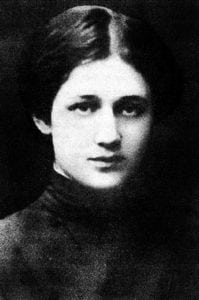“BLESS THEM, O LORD”
My daughter is Russian. My husband and I brought her from Siberia to the States in 2005. She was just a few months shy of six years old. I’d never have made this record were not for her.
Like my daughter, Anna Akhmatova was Russian. She was born in 1889 and died in 1966. Most of her life was spent in St. Petersburg. She survived 30 years of Stalin, two world wars and the imprisonment and execution of many friends and loved ones. Her only child was sent to the Gulag two times for the crime of being Anna Akhmatova’s son. In 1946, accused of having a corrupting influence on Soviet youth, she was named an enemy of the state and banned from the writer’s union, thereby losing the small pension that’d been keeping her afloat. It was the kindness of friends that prevented a fall into abject poverty. While many of her peers were fleeing the country, she chose to stay and be a witness, using her poetry in service to the land and the people she loved.

Iris Dement from Trackless Woods Liner Notes
I didn’t know any of this the day I came across a handful of her poems in a book a friend had loaned me. The cover of the book is red, with a drawing of a Russian samovar on it. The words “An Anthology of Russian Verse” are printed inside the samovar. I opened it up and read my first Anna Akhmatova poem, “Like a White Stone “, and by the time I’d finished reading it a second time, I felt like somebody (besides me) had started talking to me. What I heard was: “Set that to music.” So I did. After reading a few more of her poems, I heard: “keep going”. So, I argued back. I said that I didn’t know how to do this sort of thing and “they” must be confusing me with someone else. And then “they” said: “I will help you.” And that was that. I trusted the messenger and kept going.
That was four years ago. There were a lot of stops and starts. I’d move away from it for a while, and then I’d remember the clarity of that message, and return. Some of the melodies took a lot more effort than others, but, I never felt alone and the task never felt daunting. Anna’s gift of song is so strong, about all I had to do was get really quiet and listen.
I recorded the record in my living room over a five day period in June 2014 with a group of musicians and friends whose generosity of spirit is right up there with Anna’s. Richard Bennett, my co-producer, took this project on with a level of care and commitment I could never have dreamed. My friend, Leo Kottke, was the first person I spoke with who not only knew of Anna, but loved her work. I asked him to be there with us and he was kind enough to not make me beg: he stayed the whole time and brought things to the songs that only he could.
Nadezhda Mandelshtam was a close friend of Anna’s, and in one of her writings she said that Anna had remained “a homeless and lonely wanderer to the end of her life.” Tonight, I was listening to the final masters of this record, when Anna’s poem “Song About Songs” came on. She says, in the part that I call the chorus:
Others will reap. I only sow.
When the triumphant scythers lay the grain low,
Bless them, O Lord!
Well, first of all, nobody says that! Not then; not now. But there it is. There SHE is.

Anna Akhmatova 1905
Anna’s home was in the hearts of the Russian people. And now, she is in my heart, too. And somehow, all these decades later, at a kitchen table in the middle of Iowa, I am reaping what she so faithfully sowed — And, being ever so blessed!
I hope that you will hear, reap and be blessed, too.
In international adoptions, children, in order to gain a family, have to give up their country and all that goes with it. It’s a high price to pay. I wanted to give back to my daughter some of what she lost. Anna Akhmatova has made that possible. Thank you, dear Anna!
Iris
2015
Thank you to everyone who worked on this record and to the many friends and family, and a few strangers, too, who encouraged me aIong the way.
With love and gratitude this one’s
dedicated to Greg & Dasha


